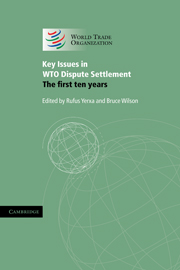Book contents
- Frontmatter
- Contents
- Notes on contributors
- Preface
- Table of cases
- Abbreviations
- PART I Introduction and General Considerations
- 1 The power of the WTO dispute settlement system
- 2 The WTO dispute settlement and general international law
- PART II The WTO Dispute Settlement System: Its Processes and Its Institutions
- PART III The WTO Dispute Settlement System: Systemic and Other Issues
- PART IV Annexes
2 - The WTO dispute settlement and general international law
from PART I - Introduction and General Considerations
Published online by Cambridge University Press: 04 August 2010
- Frontmatter
- Contents
- Notes on contributors
- Preface
- Table of cases
- Abbreviations
- PART I Introduction and General Considerations
- 1 The power of the WTO dispute settlement system
- 2 The WTO dispute settlement and general international law
- PART II The WTO Dispute Settlement System: Its Processes and Its Institutions
- PART III The WTO Dispute Settlement System: Systemic and Other Issues
- PART IV Annexes
Summary
I have been asked by way of introduction to the contributions that follow to address the subject ‘WTO Dispute Settlement and General International Law’. Such a topic needs volumes and to treat it here in a few words is well-nigh impossible.
As some of the readers may not be familiar with the mechanics and the dynamics of the WTO system, I shall first describe briefly how the process of WTO dispute settlement looks from the outside to a lawyer who tries to classify it and where it can fit in the usual categories he has in mind. Then I will briefly comment on the substantive law which is applied.
If we want to classify the process of dispute settlement in the WTO, where would we put it? Is it mediation? Is it conciliation? Is it arbitration? Is it judicial settlement? Where in these types does it fit best?
Rufus Yerxa has described in the previous chapter how the system was created and developed, but I would like to add one or two observations to his. GATT was established under very peculiar circumstances, because there was supposed to be a third international economic organization in addition to the Bank (IBRD) and the Fund (IMF) that would deal with international trade: the International Trade Organization (ITO), not the WTO.
Its constitution was adopted in 1947, the Havana Charter. But the Havana Charter was very heavily attacked in the United States, and had no possibility of passing the Senate.
- Type
- Chapter
- Information
- Key Issues in WTO Dispute SettlementThe First Ten Years, pp. 7 - 12Publisher: Cambridge University PressPrint publication year: 2005
- 5
- Cited by



